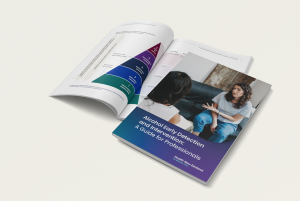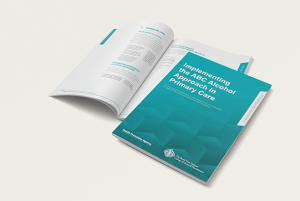Having conversations about alcohol - a digital toolkit
Screening, brief intervention and referral for treatment (SBIRT), is an evidence-based, best practice approach, to reduce alcohol harm. It is important health professionals are supported to have skilled and empathetic conversations with patients, clients and families about alcohol use. These conversations help identify hazardous or harmful drinking. They are an opportunity to provide feedback, information, and advice about reducing alcohol use, and its impacts on health and wellbeing.
Refer to the disclaimer and references at the bottom of this page.
SBIRT tools and resources
The Alcohol ABC Approach is a model of SBIRT. This approach embeds alcohol assessment and advice across the health system and in everyday practice by health care professionals who are not specialist mental health and addiction practitioners.
Health professionals using the Alcohol ABC Approach ask people about their alcohol use before making an assessment. They will provide tailored brief advice, and refer for counselling by alcohol support services, or recommend other resources if required.
These two resources provide an overview of the Alcohol ABC Approach.
Learning resources to support health professionals to have conversations with patients or clients about alcohol use. These e-learning modules require registration or login.
These tools support health professionals to identify hazardous or harmful alcohol use. Some of these tools also support having conversations with people after assessment, including brief advice.
- Alcohol Use Disorders Identification Test (AUDIT): A screening tool designed by the World Health Organization (WHO) to help detect alcohol use disorders as well as less severe alcohol problems.
-
Alcohol Use Disorders Identification Test for Consumption (AUDIT-C): This assessment is based on the first three questions of the full 10-question AUDIT and helps to identify patients who are drinking hazardously. Health professionals should complete the full AUDIT for people who are drinking hazardously.
-
Alcohol Risk Communication Tool (ARCT): A tool to support health professionals to communicate alcohol harm risk as part of brief advice to people and to talk with them about ways to reduce their risk based on their AUDIT screening score.
The following tools support health professionals to identify hazardous or harmful use of a range of drugs including alcohol.
- Alcohol, Smoking and Substance Involvement Screening Test (ASSIST): A test developed by WHO to assist early identification of substance use related health risks and substance use disorders in primary care, general medical care and other settings.
- Car, Relax, Alone, Forget, Friends, Trouble (CRAFFT): A health screening tool designed to identify substance use, substance-related driving and riding risk, and substance use disorders for young people aged 12-21.
- Substance and Choices Scale and Brief Intervention (SACS-ABC): A tool designed to help identify young people at risk of alcohol and other drug problems and to guide brief intervention, further treatment and referral options.
The resources in this section are self-help, online and telehealth services. To make referrals for your patient or client to speciality alcohol support services, refer to Health Point, or your local pathways for a list of community and residential based services.
|
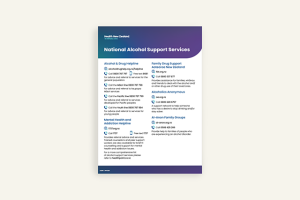 |
- Website: Alcohol and other drugs support service list on Healthify He Puna Waiora
Information, booklets and posters to support conversations with patients and clients about alcohol.
Website: Alcohol and health advice
Website: Regional HealthPathways. This website requires registration or login.
| Poster: Alcohol and the body: Long term effects | 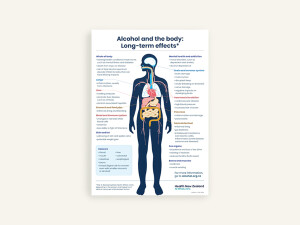 |
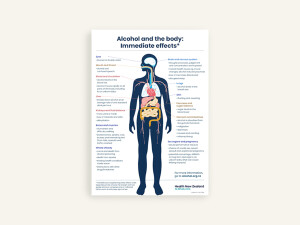 |
|
|
Booklet: Is your drinking ok? |
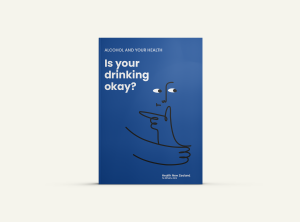 |
|
Booklet: Cutting down |
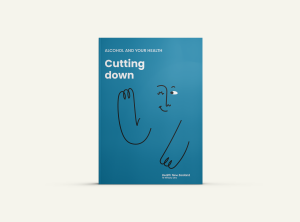 |
|
Booklet: Stopping drinking |
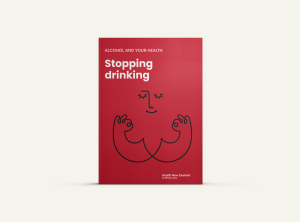 |
|
Booklet: Maintaining the change |
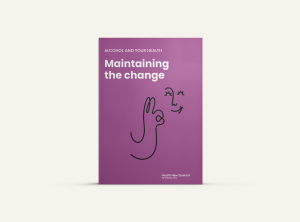 |
|
Booklet: Concerned about someone's drinking? |
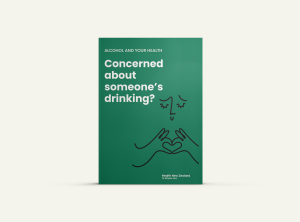 |
Conversation aids for health professionals
Advice and resources about the importance of alcohol-free pregnancies. These resources can be used during conversations about alcohol and can be given to people to take away.
|
Conversation starter card: Alcohol ABC Approach: Pregnant people |
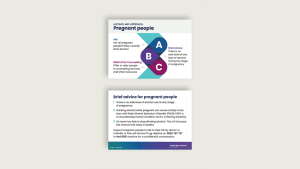 |
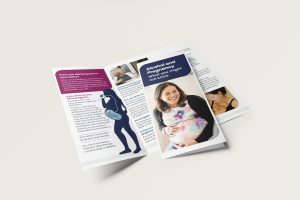 |
|
|
Information sheet: Alcohol-free pregnancy key messages |
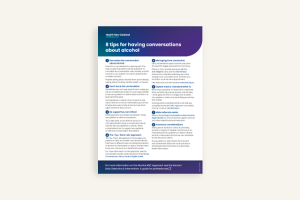 |
Resources to assist health professional about how to have a conversation about alcohol.
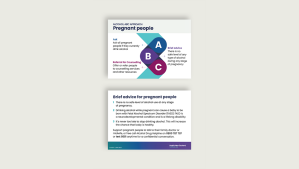 |
|
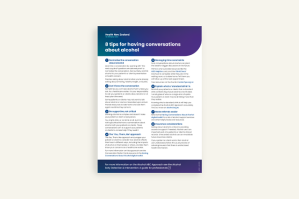 |
Click on the button if you'd like to receive an email when we add new resources to this toolkit.
References
- British Columbia Centre of Substance Use. (2019). Provincial Guideline for the Clinical Management of High-Risk Drinking and Alcohol Use Disorder.
- Kaner, E. F., Beyer, F. R., Muirhead, C., Campbell, F., Pienaar, E. D., Bertholet, N., ... & Burnand, B. (2018). Effectiveness of brief alcohol interventions in primary care populations. Cochrane database of systematic reviews, (2).
- Babor, T. F., Casswell, S., Graham, K., Huckle, T., Livingston, M., Österberg, E., ... & Sornpaisarn, B. (2022). Alcohol: no ordinary commodity: research and public policy. (3rd ed.). Oxford University Press.
Disclaimer
The information provided on this Toolkit page does not replace standard operating procedures. Health professionals should always refer to their local guidance, protocols and resources about having conversations about alcohol.
If you have identified that your patient or client is at high-risk of addiction, provide brief advice and strongly recommended a referral to alcohol support services (consent is required).
If you have identified that your patient or client is suffering from withdrawals, ensure they receive immediate medical attention and refer to Alcohol.org.nz — Help and support and Mental Health and Addictions - Healthpoint for more information.
